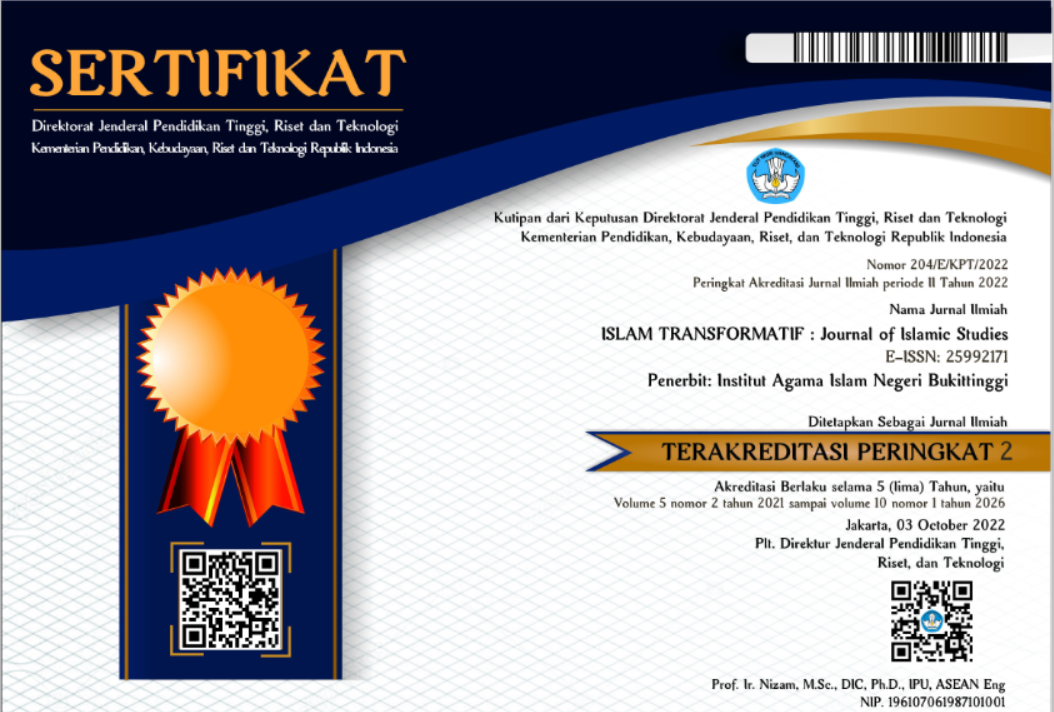Religious Messages Without Religion In Nas Daily Online Videos (Displacement Analysis in Authority)
DOI:
https://doi.org/10.30983/it.v5i1.4054Abstract
References
Abdillah, J. (2017). RADIKALISME AGAMA: Dekonstruksi Tafsir Ayat-Ayat “Kekerasan†Dalam Al-Qur’an. Kalam, 8(2), 281. https://doi.org/10.24042/klm.v8i2.224
Akmaliah, W. (2018). Bukan Sekedar Penggaung (Buzzers): Media Sosial dan Transformasi Arena Politik. Maarif, 13(1), 9–25. https://doi.org/10.47651/mrf.v13i1.9
Arrobi, M. Z., & Nadzifah, A. (2020). Otoritas Agama di Era Korona: Dari Fragmentasi Ke Konvergensi? Maarif, 15(1), 197–215. https://doi.org/10.47651/mrf.v15i1.85
Biel, J., Aran, O., & Gatica-Perez, D. (2011). You Are Known by How You Vlog: Personality Impressions and Nonverbal Behavior in YouTube. Artificial Intelligence, 446–449. http://www.idiap.ch/~jibiel/pubs/BielAranGaticaICWSM11.pdf
Biel, J. I., & Gatica-Perez, D. (2010). Voices of vlogging. ICWSM 2010 - Proceedings of the 4th International AAAI Conference on Weblogs and Social Media, 211–214.
Burhani, A. N. (2016). Aksi Bela Islam: Konservatisme dan Fragmentasi Otoritas Keagamaan. Jurnal Maarif Institute, 11(2), 15–29.
Campbell, H. A. (2012). Digital religion: Understanding religious practice in new media worlds. In Digital Religion: Understanding Religious Practice in New Media Worlds. https://doi.org/10.4324/9780203084861
Castells, M. (2013). The Network Society. The Network Society. https://doi.org/10.4337/9781845421663
Fahyuni, E. F., & Aini, W. (2019). Pengembangan Video Pembelajaran Tutorial Sujud pada Mata Pelajaran Pendidikan Agama Islam pada Sekolah Menengah Pertama. Halaqa: Islamic Education Journal, 3(1), 43–52. https://doi.org/10.21070/halaqa.v3i1.2116
Gao, W., Tian, Y., Huang, T., & Yang, Q. (2010). Vlogging: A survey of videoblogging technology on the web. ACM Computing Surveys, 42(4). https://doi.org/10.1145/1749603.1749606
Griffiths, M. D. (2018). Facebook addiction. Psychiatria Hungarica : A Magyar Pszichiatriai Tarsasag Tudomanyos Folyoirata, 33(1), 25–34.
Hanik, U. (2014). Pluralisme Agama Di Indonesia. Jurnal Pemikiran Keislaman, 25(1), 44–63. https://doi.org/10.33367/tribakti.v25i1.154
Haryadi, D. (2020). Otoritas Keagamaan Baru: Habituasi dan Arena Dakwah Era Digital. Islamic Insights Journal, 2(2), 69–82. https://doi.org/10.21776/ub.iij.2020.002.02.01
Haryanto, D. (2018). Komodifikasi Agama Pada Media Sinema Sebagai Strategi Jualan Industri Perfilman Indonesia. Journal of Urban Society’s Arts, 4(2), 61–70. https://doi.org/10.24821/jousa.v4i2.2161
Huang, T. H., Ferraro, F., Mostafazadeh, N., Misra, I., Agrawal, A., Devlin, J., Girshick, R., He, X., Kohli, P., Batra, D., Zitnick, C. L., Parikh, D., Vanderwende, L., Galley, M., & Mitchell, M. (2016). Visual storytelling. 2016 Conference of the North American Chapter of the Association for Computational Linguistics: Human Language Technologies, NAACL HLT 2016 - Proceedings of the Conference, Dii, 1233–1239. https://doi.org/10.18653/v1/n16-1147
Jinan, M. (2012). New Media dan Pergeseran Otoritas Keagamaan Islam di Indonesia. Jurnal Lektur Keagamaan, 10(1), 181–208. https://jurnallekturkeagamaan.kemenag.go.id/index.php/lektur/article/view/178
Jinan, M. (2013). Intervensi New Media dan Impersonalisasi Otoritas Keagamaan di Indonesia. Jurnal Komunikasi Islam, Vol. 3(2), 321–348.
Luqyana, Y. D., & Sukmono, F. G. (2020). Isu Intoleran dan Video Akun Menjadi Manusia (Sebuah Pendekatan Penerimaan Penonton). Jurnal Audiens, 1(1). https://doi.org/10.18196/ja.11010
Misbah, A. (2018). Fashion dalam Konstruksi Otoritas Ulama: Pandangan Kiai Shalih Darat. Jurnal Kajian Islam Interdisipliner, 3(1), 61–84.
Misbah, A. (2019). Fun and Religious Authority : Socializing Anti-Music on Instagram. Jurnal Masyarakat & Budaya, 21(2), 149–168.
Mustaqim, M. (2019). Analisis Nilai-Nilai Toleransi Dalam Kurikulum Pendidikan Agama. Jurnal Pendidikan Agama Islam, 16(1), 75–94. https://doi.org/10.14421/jpai.2019.161-05
Noor, H. (2012). Dinamika Otoritas Keagamaan di Indonesia. Jurnal Indo-Islamika, 2(2), 311–316. https://doi.org/10.15408/idi.v2i2.1188
Nurjanah, C., Junaedi, J., & Fatoni, U. (2020). Pesan Dakwah Minoritas dalam Vlog. Tabligh: Jurnal Komunikasi Dan Penyiaran Islam, 5(4), 425–442. https://doi.org/10.15575/tabligh.v5i4.1485
Rahman, F. (2018). Otoritas Keagamaan Nyai Pandalungan: Dinamika Otoritas Keagamaan Perempuan dalam Konteks Budaya Lokal. Annual Conference for Muslim Scholars (AnCoMS) Kopertais Wilayah IV Surabaya, 17(1), 959–971.
Rizky, F. U., & Syam, N. (2021). Jurnal Ilmu Komunikasi dalam Mengubah Sikap Moderasi Beragama.
Rofiq, M. (2013). Krisis Ototirtas Keagamaan Kontemporer: Literalisme Berjubah Salafi. Jurnal TARJIH, 11(1), 99–112.
Rumadi, R. (2012). Islam Dan Otoritas Keagamaan. Walisongo: Jurnal Penelitian Sosial Keagamaan, 20(1), 25. https://doi.org/10.21580/ws.20.1.183
Sulaeman, A., Darodjat, D., & Makhrus, M. (2020). Information and Communication Technology dalam Pembelajaran Pendidikan Agama Islam. Islamadina : Jurnal Pemikiran Islam, 81. https://doi.org/10.30595/islamadina.v0i0.7258
Wahidin, U. (2018). Implementasi Literasi Media Dalam Proses Pembelajaran Pendidikan Agama Islam Dan Budi Pekerti. Edukasi Islami : Jurnal Pendidikan Islam, 7(02), 229. https://doi.org/10.30868/ei.v7i2.284
Waluyajati, R. S. R., & Nurani, H. (2016). Islam dan Studi Agama-Agama di Indonesia. Religious: Jurnal Agama Dan Lintas Budaya, 1(1), 51–62.
Digital & Sosial Media
https://www.timesofisrael.com/for-israeli-arab-one-minute-video-blogger-time-is-of-the-essence/
Downloads
Published
How to Cite
Issue
Section
Citation Check
License
Authors who publish with this journal agree to the following terms:
- Authors retain copyright and grant the journal right of first publication with the work simultaneously licensed under a Creative Commons Attribution-ShareAlike 4.0 International License that allows others to share the work with an acknowledgment of the work's authorship and initial publication in this journal.
- Authors are able to enter into separate, additional contractual arrangements for the non-exclusive distribution of the journal's published version of the work (e.g., post it to an institutional repository or publish it in a book), with an acknowledgment of its initial publication in this journal.
- Authors are permitted and encouraged to post their work online (e.g., in institutional repositories or on their website) prior to and during the submission process, as it can lead to productive exchanges, as well as earlier and greater citation of published work (See The Effect of Open Access).




